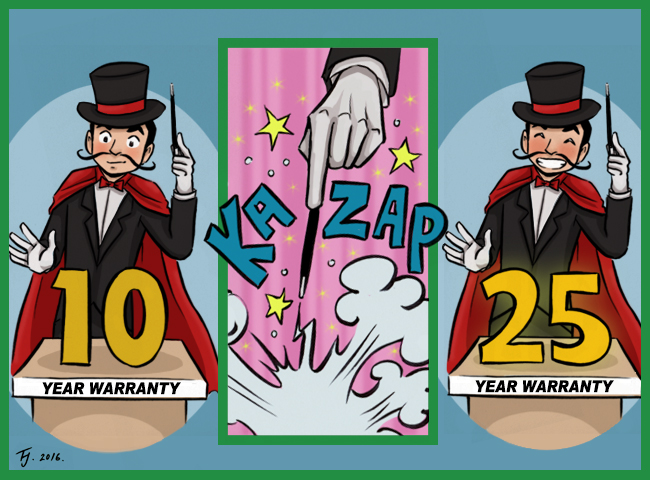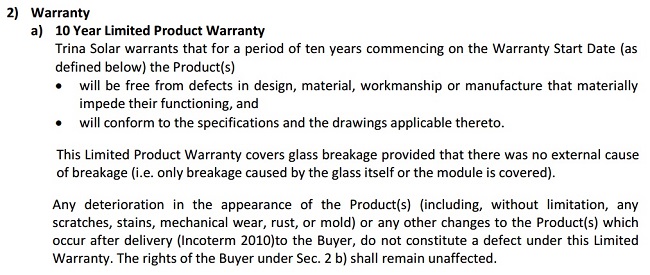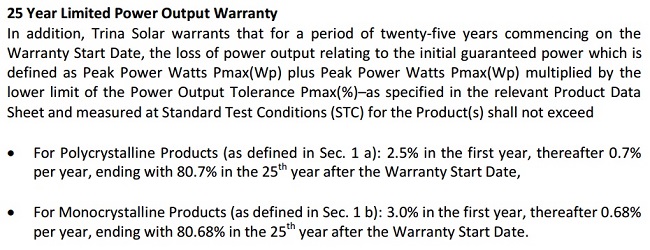
Has your solar panel’s ‘product warranty’ has been magically transformed from 10 to 25 years thanks to Australian Consumer Law?
When people ask me about solar panel warranties, I tell them to look at the product warranty. This is usually for 10 or 12 years.
I tell them not to worry about the performance warranty, which is normally for 25 years or sometimes 30. You see, while most manufacturers are happy to honor their product warranties, not all of them expect to replace solar panels that fail while they are only covered by their performance warranty.
I think some manufacturers believe their performance warranty doesn’t place them under the same obligation to repair, replace, or give a refund for panels that fail as their product warranty does.
But in my opinion1, there is no difference under Australian Consumer Law between a product warranty and a performance warranty. One is exactly as binding as the other.
You may say, “Well, that’s just your opinion, man.” But if taken to court, I am confident it will become the legal system’s opinion too. As a result, many solar panel manufacturers, and potentially installers, may find themselves legally required to either repair, replace, or give a refund for aging solar panels up to 15 years after the product warranty has expired.
Product Warranties
In their product warranties manufacturers promise panels will be free of defects for a set time. The standard is 10 years, but 12 year product warranties are becoming more common.
At 25 years, SunPower offers the longest product warranty for any panel widely sold in Australia. Both SunPower and Solarwatt have product warranties as long as their performance warranty. They are the only two companies I know that have done this.
Product warranties seem very straight forward. If, due to no fault of your own, a panel stops working or performs poorly you are entitled to either a repair, a replacement, or a refund. While there can be variation in how quickly and how well they respond, in general large panel manufacturers promise to give recompense for panels that fail during their product warranty period.
A Product Warranty Example – Trina Solar
Trina Solar is a large provider of tier one panels in Australia. To give an example, I have extracted the terms of their product warranty and placed them below:

Trina Solar’s Product Warranty. (Image credit: Trina Solar)
If you’d like to read it all, you can download it here.
Performance Warranties
A performance warranty, also known as a ‘power output warranty’, promises a panel’s performance will not fall below a specific level. Usually this is 80% or more of its rated performance after 25 years or in some cases 30 years.
You may, quite reasonably, think this is very similar to a product warranty and conclude that if a panels falls below the specified level during this time you are entitled to restitution. I say that under Australian Consumer Law it is exactly like a product warranty and restitution is precisely what you are be entitled to.
The question is, if solar panel manufacturers think they are the same, why do they give two different warranties for different lengths of time? Why not just give one warranty for 25 or 30 years?
The answer is very simple. They want to give consumers confidence that the solar cells in their panels won’t degrade too much over 25 years. But they don’t want to be on the hook for any other manufacturing defects for 25 years.
Performance Warranty Example – Trina Solar
So you can get an idea of what they’re like, I have placed Trina Solar’s performance Warranty below:

Trina Solar’s performance warranty. (Image credit: Trina Solar)
How They May Try to Wriggle Off The Hook
I think it is quite possible some panel manufacturers do not intend to honor their performance warranties. I’ve had a representative of a Chinese panel manufacturer cheerfully tell me their performance warranty is,
“Just a piece of paper.”
I won’t tell you which company he works for in case his boss tracks him down and terminates him2.

“Hasta la employment, baby!”
It seems obvious that if a panel completely fails or its output falls below the specified level after its product warranty ends but while still covered by its performance warranty, then a manufacturer would have to repair it, replace it, or give a refund.
But most problems that would cause a panel to either fail entirely or perform poorly are most likely to be the result of,
“…defects in design, material, workmanship, or manufacture that materially impede their functioning.”
If those words seem familiar, it’s because I lifted them directly from the product warranty example I provided.
It is possible some manufacturers will argue that – because their product warranty covers these defects – their performance warranty doesn’t. In fact it seems the only reason to have two separate warranties: a strong 10-12 year product warranty and a much weaker 25 year performance warranty.
Many solar panel manufacturers may think they are not required to do anything about panels that fail due to these defects while only covered by their 25 year performance warranty.
Fortunately, while it is possible for a manufacturer to make this argument, they are on the thinnest of thin ice. Under Australian Consumer Law warranties simply do not work that way.
You see there is a concept in Australian Consumer Law known as ‘Express Warranties’.
Express Warranties
An express warranty is a promise given about a product in addition to any other warranties. They can be given verbally, such as when a sales person tells you how long a product will last, or they can be written down on a piece of paper.
Normally when we talk about warranties we mean written ones, but a verbal warranty is just as valid. The difference between them is, if it isn’t recorded in some way, it is a lot easier for someone to deny that they gave a verbal one.
Under Australian Consumer Law, all express warranties must be honoured. And critically, the express warranty is not defined by the small print. It is defined as what a reasonable person would conclude from what they are told or what is prominently displayed.
Imagine a customer looks at a solar panel datasheet and sees the words, “25 Years Linear Power Output Warranty” on the first page. It is quite reasonable for them to conclude that if a panel stops working or its performance falls below the specified level, they will receive a repair, replacement, or refund for a period of 25 years. As it is reasonable for them to reach that conclusion, that is what the panel’s warranty will be.
Small print cannot take away what large print promises.
Australian Warranty Law: Don’t Lie!
Australian Consumer Law is really quite simple with regard to warranties. Suppliers and manufacturers cannot lie. If they are not willing to repair, replace, or give a refund for panels that fail within 25 years, then they cannot offer a 25 year performance warranty.
How Could It Play Out In Court?
If panel with a performance warranty fails and the person or business that provided the warranty does not provide a suitable remedy, then the consumer can take the matter to their local Consumer Tribunal or even to court.
The Tribunal will prefer the two parties come to a mutually satisfactory agreement themselves, but if a magistrate has to make a ruling I’m very confident they would come down on the side of the customer thanks to strength of Australian Consumer Law. If the manufacturer is lower than a snake and tries to fight it, then just like a snake, they won’t have a leg to stand on.
If they try to argue that failures due to defects are only covered by the product warranty and not the performance warranty, I can imagine how the conversation might play out:
CUSTOMER: When I purchased my solar panels I was told they had a 25 year performance warranty. Here are copies of the datasheet and advertising that clearly state this.
PANEL MANUFACTURER: Because our product warranty covers defects and her panel stopped working because of a defect after its product warranty ended, our performance warranty doesn’t cover that defect and so we are under no obligation to fulfill our performance warranty.
MAGISTRATE: You’ve got to be shitting me, right?
Now it is possible the magistrate will express her sentiments using slightly more legal sounding terms such as, “Et de stercore plenum3“, but I am certain that will be the general gist of her response.
Who Is On The Hook?
The manufacturer must honor any express warranties it gives for its product. But if the manufacturer doesn’t have an office in Australia, then whoever imported the panels is considered to be the manufacturer.
But it is the solar installation/retail company that has the contract with the consumer. It is the solar company’s responsibility to organise any remedy under by the manufacturer’s warranty. They cannot palm the consumer off to the manufacturer or importer.
It Is Not A Disaster For The Industry
I honestly don’t think a considerable number of solar panel manufacturers realize what they have gotten themselves into by offering 25 or 30 year performance warranties in Australia. I think some are expecting that the warranty wording will let them wriggle out of most 25 year performance warranty claims.
These manufacturers may have to either replace or give refunds for a lot of panels they weren’t expecting to and haven’t budgeted for. However, it is not necessarily a disaster for them.
Firstly, 25 or 30 years is a long time. A lot of people are going to forget about the 25 year performance warranty for their panels. Also, plenty of people will change address in that time and many won’t have the original documentation for the panels on their roof. Not having the original documents doesn’t mean they can’t make a warranty claim, but it will discourage many people.
Secondly, if a manufacturer makes quality panels, the failure rate should be low. They may have to replace or give refunds for more panels than they expected, but the number should only be a tiny fraction of the total installed.
If it’s not, well that’s what happens when you sell crap. Of course, it is very likely that those who do manufacture crap will no longer be around to honor their warranties. In which case the solar installation company which sold the crap panels will have to make good on the warranties. But then those companies will probably also be long gone too. So best all round not to buy cheap, crappy solar panels eh?
Thirdly, solar panels are continuing to fall in price and will do so for a long time. Solar panels cost one sixth as much as they did just eight years ago and the cost is still falling. The cheaper they get, the less it will cost to replace ones that fail.
What Panel Manufacturers Need To Do
Solar panel manufacturers who are not prepared to replace panels that fail over the next 25 or 30 years need to either shorten their performance warranties so they are the same length as their product warranties or combine the two into a single warranty.
Manufacturers also need to prepare to replace or give refunds for existing panels that fail while covered by a performance warranty.
The solar market in Australia really started to take off about 8 years ago, so there are very few solar panels installed in Australia that are out of their 10 year product warranty. But as those panels reach the ripe old age of 10 years, performance warranties will start to kick in for millions of panels.
Fair, simple, and rapid procedures will required to replace or give refunds for panels that fail. Manufacturers who try to wriggle out of this obligation in court will see their reputations hurt.
Caveat Emptor
I am not a lawyer, but I am confident what I have written above is generally correct. If you want professional legal advice you’ll have to consult a lawyer. If you do, please let me know what they say in the comments.
Of course, consulting a lawyer can cost money. At one point I didn’t want to pay for legal advice, so I married a lawyer. I can’t say that ended well for me, but at least I was able to keep the horse4.
Footnotes
- No I did not go to law school – so bear that in mind ↩
- If I had evidence his company was worse than similar ones, I would tell you its name. But because I suspect it is no worse and no better than a number of others, I’ll avoid the possibility of his candor getting him in trouble. ↩
- Latin for, “You are full of shit.” ↩
- Horse, house – it turns out that in legal settlements it is important to pay attention to the subtle distinction between the two. ↩

 RSS - Posts
RSS - Posts



Of course if the company fails within the warranty period all bets are off. 8[]
I actually did well in this regard. Since the components used in my installation were selected and recommended by the installer, who’d done his own research (and had the qualifications to understand what he was getting), I wrote up a contract between his company and myself that made the company responsible for fulfilling the terms&conditions of the warranties.
(which were VERY comprehensive to begin with), and included the stipulation that ~ should his company cease to exist ~ he be personally liable.
Not only did he freely provide his name/address/etc., but showed me photos of the same components installed on his house and that of his parents.
He was confident enough in his skill and judgment that he had no problem with accepting those conditions. The sort of vendor you’d WANT to work for you: why settle for less..
I suggest that’s a good benchmark for the acceptance for ANY warranty issue. It’d certainly get rid of the rip-of merchants, and might possibly have a domino effect all the way down the line to the manufacturer’s mother-in-law.
It’s YOUR money Ralph; YOU make the rules.
What could be the tribunal’s or legal position on those arguments 20 years in after a panel’s product warranty has lapsed but the performance warranty still applies? Any suggestions/experience?
Consumer:
The limited performance warranty states that the panel performs at the specified level for the given period. So my failed panel clearly doesn’t perform at that level. I request replacement.
Vendor:
The limited performance warranty is intended to cover the performance of the panel provided it hasn’t experienced a fault that would fall under the shorter product warranty. Since it has failed completely, and is out of product warranty, we are sorry but can’t accept your claim.
Australian Consumer Guarantees seem pretty clear so I don’t think they’ll be able to wriggle out:
https://www.accc.gov.au/consumers/consumer-rights-guarantees/consumer-guarantees
But I must admit they don’t seem to apply to electricity retailers, so I guess I can’t be 100% sure…